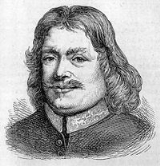
John Bunyan
John Bunyan a Christian writer and preacher, was born at Harrowden (1 mile south-east of Bedford), in the Parish of Elstow, England. He wrote The Pilgrim's Progress, arguably the most famous published Christian allegory.
One's fancy chuckle, while his heart doth ache.
reproach. For as death and the curse came into the world by a woman, Gen. 3, so also did life and health: God sent forth his Son, made of a woman. Gal. 4:4. Yea, to show how much they that came after did abhor the act of the mother, this sex in the Old Testament coveted children, if happily this or that woman might be the mother of the Saviour of the world. I will say again, that when the Saviour was come, women rejoiced in him, before either man or angel. Luke 1:42-46. I read not that ever any man did give unto Christ so much as one groat; but the women followed him, and ministered to him of their substance. Luke 8:2,3. ‘Twas a woman that washed his feet with tears, Luke 7:37-50, and a woman that anointed his body at the burial. John 11:2; 12:3. They were women who wept when he was going to the cross, Luke 23:27, and women that followed him from the cross, Matt. 27:55,56; Luke 23:55, and sat over against his sepulchre when he was buried. Matt. 27:61. They were women that were first with him at his resurrection-morn, Luke 24:1, and women that brought tidings first to his disciples that he was risen from the dead. Luke 24:22,23. Women therefore are highly favored, and show by these things that they are sharers with us in the grace of life.
The Pilgrim's Progress, (1678)
- And so I penned
It down, until at last it came to be,
For length and breadth, the bigness which you see.- "Apology for his Book".
- Some said, "John, print it;" others said, "Not so."
Some said, "It might do good;" others said, "No."- "Apology for his Book".
- The name of the slough was Despond.
- Part i.
- Every fat must stand upon his bottom.
- Part i. Compare: "Every tub must stand upon its bottom", Charles Macklin, The Man of the World, act i. sc. 2.
- Dark as pitch.
- Part i.
- It beareth the name of Vanity Fair, because the town where 't is kept is lighter than vanity.
- Part i.
- The palace Beautiful.
- Part i.
- They came to the Delectable Mountains.
- Part i.
- Some things are of that nature as to make
One's fancy chuckle, while his heart doth ache.
-
- The Author's Way of sending forth his Second Part of the Pilgrim.
- He that is down needs fear no fall.
- Part ii. Compare: "I am not now in fortune's power: He that is down can fall no lower", Samuel Butler, Hudibras, Part i, Canto iii, Line 877.
Encomium on women in The Pilgrim's Progress, (Auburn: Derby and Miller, 1853), 146:
Gaius also proceeded, and said, I will now speak on the behalf of women, to take away theirreproach. For as death and the curse came into the world by a woman, Gen. 3, so also did life and health: God sent forth his Son, made of a woman. Gal. 4:4. Yea, to show how much they that came after did abhor the act of the mother, this sex in the Old Testament coveted children, if happily this or that woman might be the mother of the Saviour of the world. I will say again, that when the Saviour was come, women rejoiced in him, before either man or angel. Luke 1:42-46. I read not that ever any man did give unto Christ so much as one groat; but the women followed him, and ministered to him of their substance. Luke 8:2,3. ‘Twas a woman that washed his feet with tears, Luke 7:37-50, and a woman that anointed his body at the burial. John 11:2; 12:3. They were women who wept when he was going to the cross, Luke 23:27, and women that followed him from the cross, Matt. 27:55,56; Luke 23:55, and sat over against his sepulchre when he was buried. Matt. 27:61. They were women that were first with him at his resurrection-morn, Luke 24:1, and women that brought tidings first to his disciples that he was risen from the dead. Luke 24:22,23. Women therefore are highly favored, and show by these things that they are sharers with us in the grace of life.
Famous Hymn by John Bunyan from The Pilgrim's Progress:
- He who would valiant be,
- Let him come hither;
- One here will constant be,
- Come wind, come weather
- There’s no discouragement
- Shall make him once relent
- His first avow’d intent
- To be a pilgrim.
- Whoso beset him round
- With dismal stories,
- Do but themselves confound;
- His strength the more is.
- No lion can him fright,
- He’ll with a giant fight,
- But he will have a right
- To be a pilgrim.
- Hobgoblin nor foul fiend
- Can daunt his spirit;
- He knows he at the end
- Shall life inherit.
- Then, fancies, fly away,
- He’ll not fear what men say;
- He’ll labour night and day
- To be a pilgrim.
